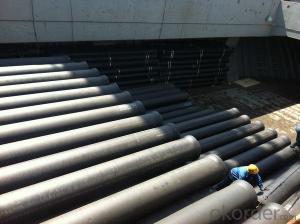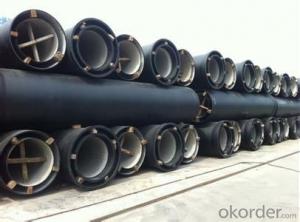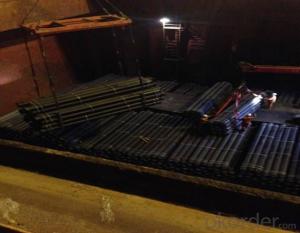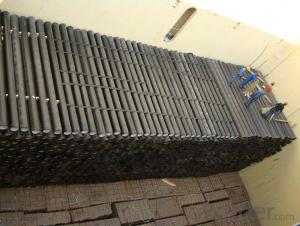DUCTILE IRON PIPE k8 DN 700
- Loading Port:
- Tianjin
- Payment Terms:
- TT OR LC
- Min Order Qty:
- -
- Supply Capability:
- 30000Tons m/month
OKorder Service Pledge
OKorder Financial Service
You Might Also Like
CNBM ductile iron pipe ranges from DN80-DN1600mm (T-Type, Class K9), effective length 6m, comply with ISO2531 Standard
Company Profile
CNBM International Corporation is the leading production base and renowned supplier of Ductile Iron Water Pipe systems of both potable and waste water in China. We are constantly looking to develop high quality products to ensure the longest service life and wonderful performance.
CNBM Pipelines regard quality as the essential factor leading to successful business. Every pipe is tested in accordance with BS EN545 (water application) or BS EN598 (sewer application). CNBM Pipelines products comply with and are tested according to the relevant European and International Standards. Our pipes are manufactured under the quality management system BS EN ISO 9001. After years of efforts, CNBM Pipelines has built up great reputation in terms of quality and service among customers worldwide
Product Introduction
CNBM ductile iron pipe ranges from DN80-DN1600mm (Tyton, T-Type, Class K7/K8/K9), effective length: 6m, complying with BS EN545/EN598/ISO2531/BS4772.
Specification& Payment terms
Internal lining: Pipes shall have an internal cement mortar lining in acc with ISO4179.
External coating: Pipes shall be externally coated with metallic zinc spray plus a further layer of resin painting to ISO8179.
Gasket: 100% SBR/NBR/EPDM gasket in accordance with ISO4633.
Packing: Pipes from DN100 to DN300 be bundled with steel belts, the others are in bulk.
Payment term: By 30% T/T advance payment + 70% Irrevocable L/C at sight.
Packing: In bulk vessel or in container.
- Q: Can ductile iron be welded? Is weldability comparable to gray iron?
- Nodular cast iron welding can be determined, this should be in some high strength cast iron equipment used more, the tensile strength of normally ductile cast iron welding in welding is higher, is worse than the grey cast iron, it is actually very difficult to distinguish with the naked eye is ductile iron or cast iron the iron in the repair equipment, we usually use WE777 special cast iron electrode universal wide welding, but it is only for maintenance use, the effect is really good, reducing the risk of cracking and high strength welding rod matching to ensure the strength of welding.
- Q: What are the typical installation methods for ductile iron pipe?
- Proper installation and functionality of ductile iron pipe involve a series of steps. Firstly, the trench must be excavated to the required depth and width, considering the pipe diameter and bedding material. Careful preparation of the trench bottom is then necessary to remove sharp objects or debris that could damage the pipe. Next, an even layer of suitable bedding material, like sand or fine gravel, is placed along the trench bottom to support the pipe and prevent point loading. This bedding material is compacted to ensure stability and eliminate any voids that may cause pipe settling or shifting over time. Once the bedding is set, the ductile iron pipe is gently lowered into the trench, taking precautions to protect the pipe's coating. Regular intervals along the trench, appropriate pipe supports or blocks are used to align and support the pipes. After proper alignment, the joints are assembled by lubricating and inserting a rubber gasket into the bell end of the pipe. The spigot end of the adjacent pipe is then inserted into the bell end, creating a secure and watertight seal. With joints assembled, the backfilling process begins. Backfill material, typically a combination of native soil and select backfill, is carefully placed around the pipe in layers and compacted to ensure stability and prevent voids. Gradual backfilling allows for proper compaction without excessive pressure or pipe damage. Finally, the trench is fully backfilled and compacted to adequately support and protect the pipe from external forces. Surface restoration is then performed to minimize disruption caused by the installation process and restore the area to its original condition. It is important to note that installation methods may vary based on project specifications, local regulations, and engineering recommendations. Consulting the manufacturer's guidelines and working closely with qualified professionals is essential to ensure proper installation of ductile iron pipe.
- Q: What are the different types of restrained joints for ductile iron pipe?
- There are several different types of restrained joints for ductile iron pipe. These joints are designed to prevent pipe separation or movement due to internal pressure, external forces, or ground movement. Some of the commonly used restrained joints for ductile iron pipe include: 1. Mechanical Restrained Joint: This type of joint uses mechanical devices such as bolts, nuts, and gaskets to hold the pipe in place. The joint is typically made up of a gland, a gland follower, and a restraint ring. The gland and gland follower compress the gasket against the pipe, while the restraint ring provides additional support and resistance against movement. 2. Push-on Restrained Joint: This joint utilizes a rubber gasket that is compressed when the two pipe ends are pushed together. The gasket provides a tight seal and also acts as a restraint against movement. Some push-on restrained joints also include additional mechanical devices to enhance the restraint capability. 3. Restrained Flange Joint: This type of joint combines the features of a flanged joint and a restrained joint. It consists of a flanged pipe end that is bolted to a flange on another pipe or fitting. The bolts and nuts provide the mechanical restraint, while the flange connection ensures a secure and leak-free joint. 4. Restrained Coupling Joint: This joint is a variation of the mechanical restrained joint. It utilizes a coupling that is bolted or clamped around the pipe ends, providing the necessary restraint. The coupling may also have a gasket to ensure a tight seal. 5. Restrained Socket Joint: This joint is similar to the push-on restrained joint, but it includes additional mechanical devices to enhance the restraint capability. The socket end of the pipe is typically designed to receive a pipe spigot, which is then secured using bolts, clamps, or other mechanical devices. These different types of restrained joints for ductile iron pipe offer varying levels of restraint and are selected based on the specific requirements of the application. They ensure the integrity and stability of the pipeline system, reducing the risk of leaks, pipe separation, or movement.
- Q: What is the K9 standard pressure for ductile iron pipes?
- Ductile iron pipe is a kind of cast iron. It is an alloy of iron, carbon and silicon. Graphite is exist in spherical form, usually graphite size is 6-7, casting spheroidization grade control requirements for 1-3 quality (spheroidization rate greater than 80%), so the mechanical properties of the material itself has been improved, has the essence of iron, steel performance.
- Q: How do ductile iron pipes perform in high-altitude areas?
- Ductile iron pipes perform well in high-altitude areas as they are highly resistant to corrosion and can withstand extreme temperature variations. The material's flexibility and strength make it suitable for handling increased pressure caused by altitude changes, ensuring reliable water distribution systems even in mountainous regions.
- Q: How long is the service life of the cast iron pipe, and the time of use of ductile iron pipes?
- When it comes to the service life of nodular cast iron, its maintenance is essential for its long service life. Then, the focus of the maintenance of ductile iron pipe is to pay special attention to, will affect the long-term use of ductile iron pipes, stable operation of socket, row, etc., we should make efforts to these aspects of the mouth without debris. Make sure that the rubber ring of the ductile iron pipe has been smashed with a rubber hammer, and it is not twisted or twisted, and it is uniformly stuck in the slot. Ductile iron pipe in the maintenance process, because of the pneumatic tube axis is buried into the ground, so in the face of a tilt angle of the time, we must be careful, if the resistance is too large, will not force the excavation, in order to prevent the distortion of the rubber ring.
- Q: What are the disadvantages of using ductile iron pipes?
- One disadvantage of using ductile iron pipes is their susceptibility to corrosion. Over time, exposure to moisture and various chemicals can cause the pipes to deteriorate and develop leaks. Another disadvantage is their relatively high cost compared to other pipe materials, such as PVC or HDPE. Additionally, ductile iron pipes are heavy and require specialized equipment for installation, which can increase labor and transportation costs.
- Q: Comparison of ductile iron pipe and spiral steel pipe
- Can only be used for drainage pipe for comparison, other uses are not mentioned in the same breath.
- Q: How does ductile iron pipe perform in areas with high soil compaction?
- Ductile iron pipe performs well in areas with high soil compaction due to its strong and durable characteristics. Its flexible nature allows it to withstand the pressure exerted by compacted soil, preventing deformation or damage. Additionally, the material's high tensile strength and resistance to cracking make it an ideal choice for areas where soil compaction is a concern.
- Q: What is the typical lifespan of ductile iron pipes?
- The typical lifespan of ductile iron pipes can vary depending on various factors such as the quality of the pipes, the environmental conditions, and the maintenance practices. However, on average, ductile iron pipes have a lifespan of around 75 to 100 years. This makes them a durable and long-lasting option for water and sewage transportation systems. With proper installation and regular maintenance, these pipes can withstand corrosion, pressure, and other external factors, ensuring their longevity and reliability. Additionally, advancements in coatings and linings have further enhanced the lifespan of ductile iron pipes, making them an excellent choice for infrastructural projects.
Send your message to us
DUCTILE IRON PIPE k8 DN 700
- Loading Port:
- Tianjin
- Payment Terms:
- TT OR LC
- Min Order Qty:
- -
- Supply Capability:
- 30000Tons m/month
OKorder Service Pledge
OKorder Financial Service
Similar products
Hot products
Hot Searches
Related keywords























